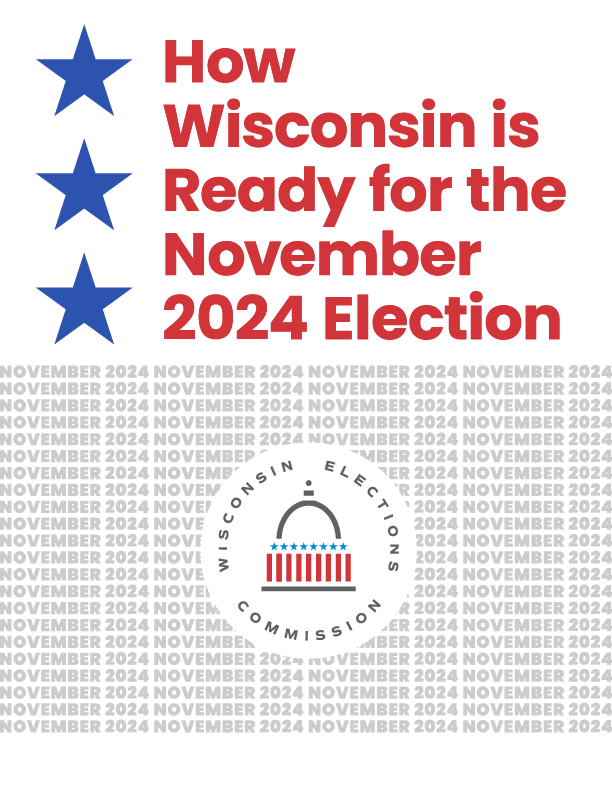Executive Summary

Based on turnout in previous Presidential Elections, more than 3 million eligible Wisconsin voters are likely to participate in the 2024 November General Election.
The Wisconsin Elections Commission (WEC) and local election officials have been preparing for this key moment since the day after the 2020 General Election, while simultaneously planning for and administering every local and state election in the interim.
At the WEC, we share the responsibility to train local election officials and support the administration of Wisconsin elections, which are run by each of the state’s approximately 1,850 city, village, and town election officials. It is these local officials who register voters, issue absentee ballots, recruit and train poll workers, and plan for safe voting. There are 72 county election officials who prepare and print ballots and secure their websites for Election Night results. Local and state election officials also share the responsibility to provide the public with factual, up-to-date information about how our elections work. Additionally, in November there will be nearly 2,500 polling places requiring more than 30,000 poll workers.
Running a fair, accurate, and transparent General Election requires each of these players, in addition to the active participation of Wisconsin citizens, to diligently complete their role in the process. This report offers extensive details about how the Wisconsin Elections Commission has prepared for the November General Election.
Wisconsin election officials have already successfully administered three elections in 2024: the February Nonpartisan Primary, the April Spring Election and Presidential Preference election, and the August Partisan Primary.
Each election is an opportunity for the Commission to analyze processes and assess opportunities for improvement. We have been carefully planning for the 2024 election cycle through updating systems and processes within the parameters of the law. These include cybersecurity initiatives, development of training for Wisconsin’s local election partners, renewed attention to voter usability, and public information sharing on the mechanics of democracy.
Agency areas of responsibility
In brief, the Commission and staff have accomplished important tasks across all agency areas of responsibility:
Internal Agency Planning
- Surveyed and closely communicated with local election officials regarding how the WEC can best support them.
Election Official Training
- Launched an updated system for local election officials to take and track training.
- Provided a variety of in-person and virtual training sessions for clerks.
- Updated key election administration manuals to comply with new best practices and changes in the law.
Statewide Voter Registration Database Preparation
- Upgraded the platform for the statewide voter registration system, allowing the WEC’s systems to receive necessary updates and security patches as soon as they become available.
- Implemented Wisconsin’s new political maps in the statewide voter registration system
- Conducted a statewide review of adjudicated incompetent records in the statewide system and prompted clerks to determine any active, registered voters needing to have their registration revoked due to incompetency adjudication.
- Continuously monitoring the statewide voter registration system for data quality and to flag voter records needing to be acted upon by local clerks, such as voter records needing to be deactivated due to death of the voter or a felony conviction.
MyVote Update
- Improving usability and security of MyVote Wisconsin site, such as through adding information on MyVote about requirements for overseas and military voters.
Accessibility Program
- Prepared to review 95 polling places in November to ensure compliance with voter accessibility requirements.
- Developed additional resources to assist clerks in understanding accessibility requirements.
Security Preparations
- Maintained continuous contact with state and federal law enforcement partners to ensure the WEC and law enforcement are aware of the latest security landscape and prepared for any contingencies.
- Offered local clerks security and cybersecurity trainings and online modules.
- Prepared to audit the performance of electronic voting equipment in 10 percent of reporting units statewide following the Nov. 5 General Election.
Absentee Envelopes
- Launched an updated absentee application/certification, mailer envelope and uniform instructions designed to improve usability of the envelopes, reduce the frequency of common mistakes, and improve visibility in the postal system.
Election Subgrants
- Authorized more than $13 million in federal funds to be directed to Wisconsin municipalities and counties to improve election administration at the local level.
Voter Outreach
- Maintained a robust and ongoing series of educational and media appearances by the agency administrator.
- Preparing communications toolkits and templated social media posts for clerks.
- Planning to launch a media campaign focusing on informing Wisconsin residents about voter education resources, including where to go to register to vote.
Customer Service
- Conducted preparations to ensure staff are prepared to respond to tens of thousands of calls and emails from voters, clerks, and others ahead of November.
Legislative Audit Bureau Report
- Following Commission and/or staff action, the 30 recommendations contained within the Legislative Audit Bureau’s 2021 election administration report are either in progress, complete, sustained, or have been superseded by legislation or litigation.
We welcome all Wisconsinites to review the contents of our detailed readiness report to see for themselves why we can say election officials are fully prepared to conduct a successful November General Election.